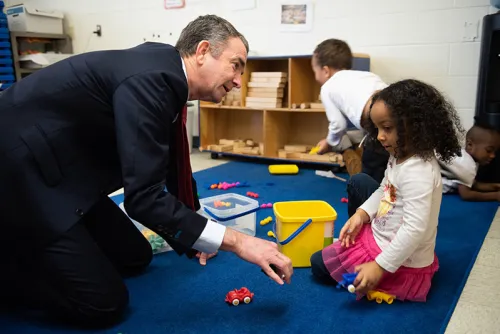Published by Early Learning Nation as part of a project with The Hunt Institute in understanding early learning challenges and successes in states across the nation.
Virginia’s governor, Ralph Northam, discusses the impact of COVID on early childhood, school readiness, and how is is supporting early childhood in his state. We are listing three of the questions. You can read all the questions and Governor Northam’s responses here.

COVID-19 has presented major challenges to the states during 2020. As you look at Virginia’s response, what makes you most proud of the Commonwealth?
I am most proud of the way Virginians have stepped up to help their neighbors in an unprecedented year. For example, right now our Department of Emergency Management is working with both the Departments of Education and Social Services, as well as private logistics companies, to deliver over $20 million worth of Personal Protective Equipment (PPE) to over 4,300 early childhood sites and adult care facilities to help them get through this difficult winter. That type of cooperation has been happening both within state government as well as in our hospitals and the community this year.
This pandemic has been especially hard on our early childhood system, but as of mid-December, over 6,000 providers are open and serving children (over 2,400 of those using public subsidy dollars) and they have kept outbreaks remarkably low. Our early childhood educators are essential to Virginia’s economic recovery and we have invested over $150 million in federal coronavirus relief funds to help them remain open. In fact, Virginia was the first state in the nation to direct Governor’s Emergency Education Relief funds (GEER) to our Pre-K system.
You recently signed an executive order to create an Executive Leadership Team on School Readiness. Why is this a priority for Virginia? What has the state learned in the process of the team developing their recommendations?
Access to quality early childhood education is essential to the long term health and well-being of our children, it is also an investment in the workforce of the future. Virginia is ranked #1 in the nation for business and we know the only way to maintain that status is to support the leaders of tomorrow.
Our leadership team last year recommended a single durable point of accountability and oversight for all early learning programs in Virginia at the Department of Education, as well the creation of a uniform mandatory quality rating and improvement system (QRIS) for all publicly funded programs by 2023. Thanks to support from legislators, we put these recommendations into code through transformational legislation in the 2020 General assembly session.
Through the work of this leadership team we also determined that 72% of three-year-old’s from economically-disadvantaged families do not have access to a quality early childhood education – that is simply unacceptable and we have made a bold goal to serve all at-risk three and four year-olds by 2026.
Finally, our teachers are the most important part of our early learning system. In 2019, we started a pilot to give recognition grants of $1,500 to attract and retain teachers in centers and family day homes, where we know teachers are paid far less than their school-based peers. The results were impressive with retention increasing by 23%, so we have prioritized directing state dollars to this program (up to $5 million in fiscal year 2022). This is an important first step in addressing inequities among our early childhood workforce.
As education continues to be a priority in your state, and with your background in pediatric medicine, what are your hopes for children in Virginia?
As a pediatric neurologist I have always said I see hope when I look into a baby’s eyes. Our children are all capable of success in school and beyond if they are given access to the basic resources they need to thrive. That’s why we continued the Children’s Cabinet, chaired by the First Lady, who is a former educator and pediatric neurologist. This group includes multiple Secretaries and is tasked with breaking down silos in state government in the major areas of nutrition, trauma-informed care and early childhood development. My hope is that this Children’s Cabinet is continued in the next administration, and that in the near future Virginia will be able to ensure that no child is hungry and no child lacks access to a world-class education. All children deserve these opportunities no matter who they are, or where they live.
You can visit our Advocacy Map to learn more about what is happening in Virginia and other States around early childhood and early childhood education.

